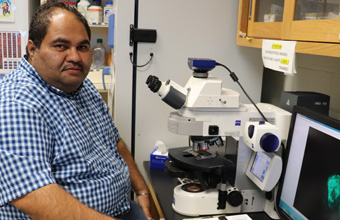College of Arts and Sciences Newsroom

Schuellein Chair in the Biological Sciences
The University of Dayton has appointed Amit Singh as the Schuellein Chair in the Biological Sciences. Singh is an associate professor of biology and director of the biology graduate program. He joined the University faculty in 2007.
Singh, a noted scientist who has received nearly $1 million in federal and private research funding, will begin his three-year, nonrenewable term Aug. 16.
He succeeds Carissa Krane, the first Schuellein Chair, who advanced the research culture within the Department of Biology and brought high-profile speakers to campus to discuss their research with faculty and students.
Established through a planned gift from alumnus and former biology department professor Robert J. Schuellein ’44, the Schuellein Chair recognizes outstanding accomplishments and contributions of a faculty member in the Department of Biology, with particular emphasis on mentoring students through research.
“Dr. Singh is an accomplished researcher with a strong record of mentoring students who aspire to careers in medicine and biomedical research,” said Jason Pierce, College of Arts and Sciences dean. “To date, he has trained more than 60 undergraduate students, and mentored five doctoral students and one master’s student, providing them with valuable experiential learning opportunities.”
Singh currently serves as interim director of the Center for Tissue Regeneration and Engineering at Dayton (TREND). He has been approved for promotion to full professor, effective Aug. 16.
His research lab focuses on genetic defects in human eye development and early detection of Alzheimer’s disease, both using the fruit fly’s eye as a model.
Last year, Singh received a $439,499 grant from the National Institutes of Health to study early eye development in fruit flies in order to understand the molecular basis of retinal disease and birth defects in the human eye. In 2010, he received a $218,250 NIH grant to research the genetic circuitry involved in regulating eye cell growth and patterning. He also has received external grants from the Knights Templar Association, Fight for Sight Inc. and the Retina Research Foundation.
As Schuellein Chair, Singh plans to increase experiential learning opportunities for undergraduate and graduate students; train graduate and postdoctoral researchers; and expand opportunities for transdisciplinary research.
“I would like to use the resources associated with the Schuellein endowment to hire and train a postdoctoral researcher for transition to a career in biomedical research and education, and to support a graduate research assistant in my lab,” Singh said. “In addition, I will work to procure new laboratory instrumentation for the natural science faculty with both internal and external support.”
Singh holds a bachelor’s degree from the Government Degree College Nahan, H.P. University, India, and a master’s and doctorate, both from Devi Ahilya University, Indore, India.
He was recommended as the second Schuellein Chair by the Department of Biology’s tenured faculty, who recognized his achievements in the areas of research, scholarship, mentorship and leadership in University efforts, said Karolyn Hansen, associate professor and biology department chair.
“Dr. Singh exemplifies the intent of Dr. Schuellein’s generous donation: Strive for academic excellence by supporting strong, research-active faculty who train undergraduate and graduate student researchers,” Hansen said.
Robert J. Schuellein, who died in 2011 at age 91, made gifts to the University totaling $2.5 million to support biology faculty research through an endowed chair. He graduated from the University in 1944 with a degree in biology and earned his doctorate and a master's at the University of Pittsburgh. He returned to Dayton during the late 1950s to teach and help establish the graduate program in biology; he mentored several of the first graduates from that program.
Schuellein left the University in 1964 to join the National Institutes of Health, where he served in the National Heart, Lung and Blood Institute and the National Institute of Dental Research, overseeing research grant administration and training programs until his retirement in 1983.
- Dave Larsen, communication coordinator, College of Arts and Sciences
